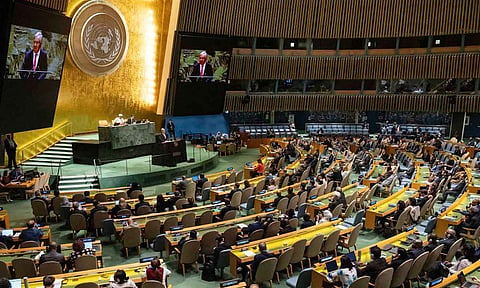

Global health and development are too dependent on Western charity. The status quo was always going to unravel eventually. Since President Trump took office for the second time more than 100 days ago, he has initiated the largest remaking of this system in decades — beginning with the announcement that the United States will withdraw from the World Health Organisation and the dismantling of the United States Agency for International Development. The consequences are dire.
The US has been the largest funder of global health since at least 2000 and is a key source of research and development and technical expertise. As a former adviser to the WHO’s director general, I’ve seen how vital these contributions are. That’s why I believe the WHO should try to make a deal with Trump — not because the current system is ideal, but because the stakes are too high to let the US walk away. Until a more resilient system is built, the WHO should work to secure US membership and make the global health ecosystem stronger in the process. This includes addressing Trump’s concerns about the COVID-19 response, the US footing an outsize share of the global health bill and the need for institutional reform.
Trump has accused the WHO of being slow to declare a public health emergency and not doing enough to investigate the origins of the pandemic. But the WHO declared a public health emergency in January 2020 and has kept both natural origin and lab leak hypotheses on the table. It has also repeatedly pressed China for transparency on the virus’s origins.
Still, the WHO can do more to assuage concerns about its pandemic response. The organisation and its members could call for a moratorium, which people close to Trump support, on risky virus research. Doing more to recognise potential missteps, like not emphasising airborne transmission of COVID early on, can help regain trust. When it comes to future pandemic responses, the WHO should adopt the US military’s approach of red teaming, in which groups are tasked with role-playing as an enemy to identify weaknesses in an organisation’s operation. A version of this approach could help the WHO identify flaws in how it responds to public health emergencies.
Trump has often criticised the fact that the United States contributes much more to global health efforts than other countries. US funding makes up around 15% of the WHO’s budget. The WHO could agree to a reduction in America’s contributions and make up some of the difference by asking other countries to increase theirs.
Funding could also be more focused on results. In recent years, the WHO has intensified efforts to gather data to track its programs’ progress toward helping countries improve the overall health and well-being of their citizens, expanding access to universal health coverage and expanding protection from health emergencies. The WHO should ensure that more money goes to programs with the greatest proven impact.
The WHO could also address criticism that the agency failed to properly condemn Hamas when it was accused of militarising health facilities during the war in Gaza. It could create an independent group to review and recommend improvements to current practices around monitoring and reporting on militarising these settings. This might draw the interest of the White House while helping to reinforce norms of international law.
Of course, it may be impossible to persuade Trump to change his mind. If that’s the case, then countries must be ready to take greater ownership of, accountability for and investment in their public health needs. As Nigeria’s health minister, Muhammad Ali Pate, recently said, “The US government is not responsible, ultimately, for the health and the security of Nigerian people. At the end of the day, the responsibility is ours.”
The key to creating that independence is supporting local scientists and entrepreneurs. Countries need the capability to produce their own health products like drugs, diagnostics and vaccines. The African Union’s goal is to locally produce 60% of the vaccines the continent uses by 2040, up from less than 1% in recent years. Some groups are already working toward this goal, such as the Institut Pasteur de Dakar in Senegal’s efforts to increase vaccine production, and companies in Egypt and South Africa will use mRNA technology to develop better vaccines. Other countries should bolster similar efforts.
Expanding homegrown health services is also a key part of this equation. M-mama, an emergency referral and transport system led by the Tanzanian government, has doubled its provision of maternal and newborn emergency trips in regions across Tanzania while reducing the cost of these trips. Talk therapy services in places like Zimbabwe and Uganda have shown great success in providing mental health access where psychiatrists are scarce. Hewatele, a nonprofit in East Africa, has developed a low-cost system for producing and distributing medical oxygen to communities where many children die from pneumonia and other respiratory infections.
Another way to reduce global dependence on the US government is to expand funding that comes from the private sector and development banks around the world. The best way to enable this is to support alternative financing models. The Global Health Investment Fund, for example, blended public and private funding to support the development of drugs, vaccines and other public health interventions. One of its greatest successes was supporting a South Korean company that became the only company in the world to make the cholera vaccine when the global emergency stockpile ran dry in 2024.
The golden age of global health as led by the US is over. The rest of the world must now focus on building a healthier world that is less dependent on US aid — and less susceptible to US influence and disruption. Greater self-reliance is the path to truly sustainable development.
©️The New York Times Company